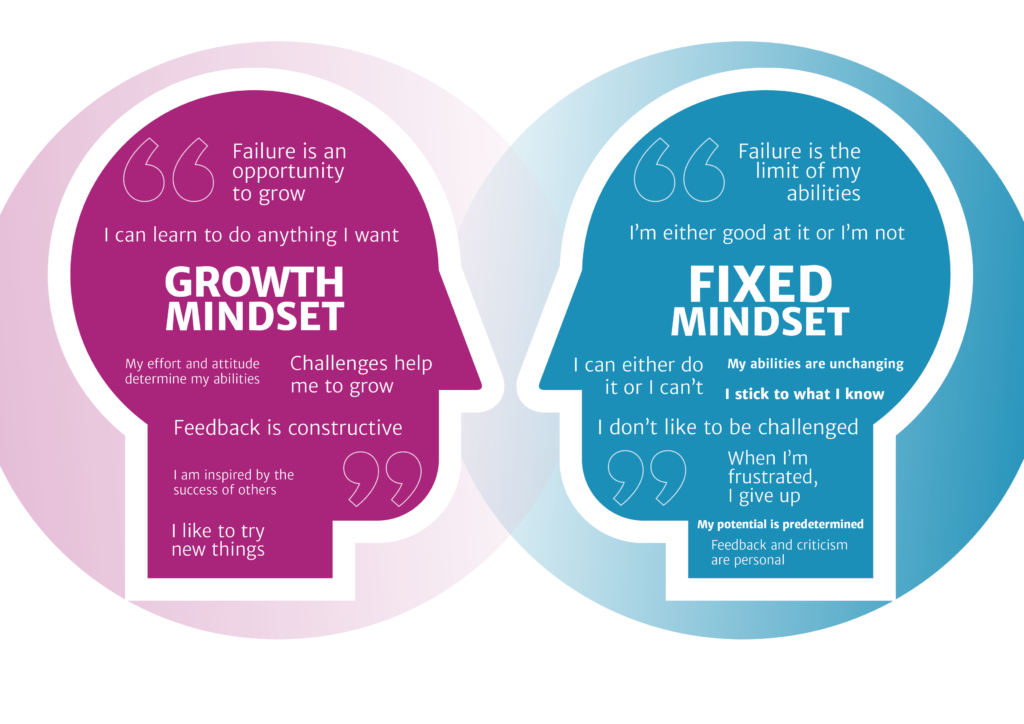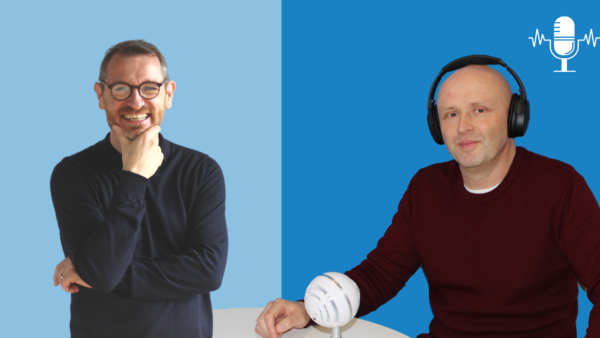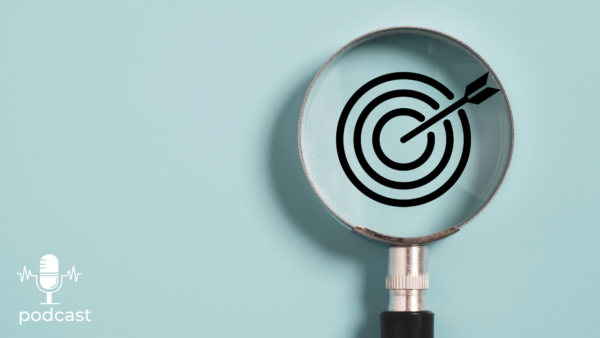What are the benefits of a growth mindset?
So today’s blog is on growth mindset. Such a powerful concept which is central to positive psychology. Evidence links growth mindset to a variety of positive outcomes: higher goal achievement, motivation, lower stress, anxiety, depression, better work relationships and higher performance levels.
There is so much science to back it up – Carol Dweck at Stanford University is the person to go to if you want the science and the evidence on the power of growth mindset. And while Dweck’s research is focused mainly on promoting the development of growth mindset in schoolchildren, fabulously, it is also possible to develop a growth mindset later in life, even if you come from a starting place of fixed mindset, as many of us do (including me – more on that later).
What is growth mindset? And what is a fixed mindset?
So, before we get on to my tips on developing a growth mindset, I need to explain what I’m talking about. I need first to explain the twin ideas of growth mindset and fixed mindset. So having a fixed mindset means that you generally believe that your abilities and your intelligence are fixed and can’t be changed and that you pretty much have had them since birth.
Having a growth mindset means that you believe that the development of skills and abilities and intelligence can evolve and change through persistence and hard work.
Why does this matter? Well, if you come from a place of fixed mindset, you might avoid challenges because you don’t want to feel embarrassed or humiliated in front of others. This can become an issue because your fear of making mistakes can lead you to avoid challenges and new experiences—experiences which could actually help you grow, develop, and create the life that you want.
Why does this matter – what happens to people with each mindset?
If you have a growth mindset, you are more likely to enjoy challenges, despite the risk, usually because you value learning and growth more than you value any anxieties you may have about others thinking you don’t know what you’re doing.
Because you’re willing to give new things a try, you often don’t know what you’re doing, at least not initially. But you don’t see that as a threat, more as an opportunity to learn and to get good at stuff that you might come to value.
With a growth mindset, you end up with a belief that you can overcome challenge and over time, you build up evidence that proves that point – so it becomes positively self-fulfilling. While following a fixed mindset is also self-fulfilling, but in the opposite direction, because your avoidance of new, potentially embarrassing, situations means that you stick with what you know as a form of self-protection, but you limit your development as a result.
The origins of fixed and growth mindset – taking it way back
By the way, most of us have been programmed to be more fixed mindset than growth mindset partly because the negativity bias primes us to be fearful of potentially threatening experiences.
And partly, because of well-intentioned teachers, parents and caregivers thinking they were being helpful when they told us that we were smart or good at something or naturally talented. When actually that feedback was setting us up to just keep doing the stuff we knew would get us that praise (the stuff we could already do) rather than pushing ourselves by taking risks which might result in failure (and therefore not praise).

As it turns out, it’s far better for our teachers and caregivers and parents to praise effort rather than achievement, because effort leads to more learning and places a longer tail on development. So, if you have the sense that you might have more of a fixed mindset than a growth mindset, what can you do?
Tips for developing a growth mindset
Here are my 5 top tips for developing more of a growth mindset whatever stage of life you’re at. It’s never too late:
1. Learning hurts so focus on the why
When we go from unconscious incompetence (the not knowing that we are bad at something), through conscious incompetence (becoming aware of how rubbish we are), through conscious competence (baby steps of progress towards being half-decent) and ultimately unconscious competence (where we have likely mastered a skill to a degree of automation) – when we go through that cycle – we go through pain.
The pain of realising our own imperfections, the pain of looking foolish as we start our journey towards skill acquisition, the pain of the time and effort it will take for us to get to our visualised goal. So often that’s enough for us to not start a new learning project or to stutter to a halt on something pretty early on after we’ve started. Pretty quickly, that pattern can lead us down the self-protection path of fixed mindset.
An antidote to this is to always focus on the why – why are you doing the thing in the first place? Where were you trying to get to, what did you want to do that felt like a positive destination or staging point? I’ve tried to learn guitar and not made it very far a few times. I’m about to try again and what I have in my head as I start into that learning endeavour is me playing a particular track that I’ve always felt rocked.
As it goes, it’s Papa Roach, Last Resort. Not because I’m a rocker and not because of the lyrics but because the guitar part is EPIC. So there’s my why. I want to be able to get to a place where I can play that guitar section and it sound good, or at least recognisable. Whatever you’re trying to develop or learn, make sure you keep the why close by.
2. Focus on the learning, not the mistakes
As Nelson Mandela was once famed to have said, “There is no failure, only learning.” Did he say that? Or was it Einstein? The internet will tell you all sorts of people said that probably, including me now. Well one thing’s for sure (probably), Thomas Edison said, “I have not failed. I’ve just found 10,000 ways that won’t work.”
And that attitude led to the invention of the lightbulb, the record player and film. And unless it was a deep fake, I’ve also heard Michael Jordan (the basketball legend) say, “I’ve missed more than 9,000 shots in my career. I’ve lost almost 300 games. 26 times I’ve been trusted to take the game-winning shot and missed. I’ve failed over and over and over again in my life. And that is why I succeed.”
So what are these people all pointing towards? That taking a positive and realistic attitude towards experience, in other words, adopting a growth mindset – learning from failure – can lead to incredible world-changing, record-breaking achievements.
Always focusing on the learning and then applying that learning next time, brings us to an inevitability of progress, because how can we do anything other than progress if we’re constantly tweaking and levelling up when things don’t go our way? Plus, we get better at pushing through the learning pain barrier that I talked about a few moments ago because we’re reprogramming ourselves to see failure and mistakes as a positive developmental experience and not as something that should induce fear, anxiety and avoidance.
My eldest son has got himself into the county basketball team after only a year of playing the sport – he’s not the tallest, he’s not a dunker, he’s not the strongest, he’s not the fastest. But, he is a role model of growth mindset and a constant source of inspiration to me to remember to always take the learning.
When I ask him ‘what did you learn from today’s training?’ he always, literally always has several answers. The guy is looking for the learning, looking to get better, bit by bit. Same with his schoolwork, quite miraculous really and a perfect demonstration that a fixed mindset is not inevitable – we can all develop a growth mindset.
3. Aim for progress not perfection
I’ve podcast before now about motivational drivers (Season 6, episode 8, How to change the habits of a lifetime) – those brain programmes we are given in early life by the people who we trust and for me, the overwhelming driver is one called ‘Be Perfect’.
In practice, what that means is that I have been programmed to avoid mistakes, to get it right, to assume that there is a right and to seek praise by getting it right. I now know this and I’m working on it, by telling myself (as much as I’ve been telling other people for my entire life) that mistakes are human, I’m human, and that’s all ok. But when I found out about growth mindset, it worried me that I might be leaking out my Be Perfect driver all over my kids, just like my Dad leaked it all over me (‘colour inside the lines!’).
So, instead of seeking perfection which is often impossible and if it is possible, it comes at such a personal price, when you aim for progress not perfection, you value the process over the end result. You start to see the tiniest of wins as wins nonetheless. You become kinder to yourself, and in time, so does your self-talk, the inner voice that gives you feedback.
If it helps with your self-talk, try and think of yourself as an eight-year old kid struggling with something but committed to getting there. What would you say to that kid – would you be critical or would you be encouraging? Encouraging right, so try and cultivate that encouraging, nurturing voice that gives you feedback all the time. I’m not saying that’s easy by the way but it’s worth keeping going with.
It will make a difference to you developing a growth mindset – a mindset that values learning and progress and the journey and not the end product.
4. Own it, honestly
Whatever your context – if you’re parenting, if you’re adulting with friends, if you’re in self-reflection – my tip here is to talk openly and honestly about mistakes when they happen: what went wrong, what happened, how that’s ok and what you learned, and what would you want to do differently next time, if anything?
When I first found out about growth mindset, typical me, I immediately started to talk with my kids each night at the dinner table about things that I had messed up during the day. To normalise it, to make it ok and to encourage them to see mistakes and messing up, failure if you like as an opportunity to learn rather than as something to be avoided.
This went on for a few weeks and then it kind of petered out, but I remember that being helpful for me (and hopefully for the kids) to start to see that it’s ok to be human and to talk about it too.
5. Growth mindset and strengths
Lastly, I want to talk about how growth mindset and strengths, based on years of experience of this area seem to have an interesting, perhaps even initially tense relationship, when people first learn about the strengths that make them unique. I’ll be honest, first off, it can feel weird to step into our strengths and to even think about stretching them because it can feel risky and actually, our underexplored, even unknown strengths may be the greatest sources of our fixed mindset.
Take my Leading strength, for example. Other people have often said to me “wow what a risk to take to start your own business, to employ dozens of people!” But to me, it’s never felt that risky. I started small, as most people do. Just me, then me plus one, two, then eight and so on.
I’ve started and run several companies, getting people round a goal, a shared purpose and moving us in that direction. But have I truly stretched that strength out of its comfort zone? For example, have a I started a movement to really shift people’s thinking in areas that matter to me? Have I? I’m not sure I have.
Have I really stretched that strength? Or am I still relying on it in that early developmental stage? What fears and anxieties might I have around this? And being honest about it, I realise what comfort there is in playing small but what opportunity there is in playing large.
Stepping into and stretching your strength areas can be a great opportunity to shift into growth mindset, take some risks, and develop new behaviours and new habits through choosing a different attitude. I have some more thoughts on this area that I shared in my podcast at Season 4, episode 2 – self-sabotage and what you can do about it.
In summary – 5 top tips for growth mindset
OK, so there’s my 5 tips:
- focus on the why,
- focus on the learning, not the mistakes,
- aim for progress not perfection,
- own your mistakes and talk about them, and
- explore and stretch your strengths.
I appreciate this isn’t relevant to everyone, but from a parenting point of view, do watch Carol Dweck talking about the power of yet and talking about the importance of helping children to develop a growth mindset – you can watch it below, or just Google Carol Dweck – Developing a Growth Mindset and you’ll find it.
It’s about 10 minutes long. By the way, all the points she makes are as relevant to adults as they are to kids.
I hope you enjoyed this week’s blog. If you’d like to get more from your every day, please do sign up to our emails for simple and practical hints and tips on everything strengths and life. There is a form at the bottom of this (and every) page on the blog to do so. Till next time, choose growth.
The Strengths Guy podcast is available on all major podcast platforms. Find it on Apple podcasts, Spotify, Google podcasts, Stitcher, ACast, TuneIn, Breaker and Soundcloud. Please support this podcast by subscribing to get them at the start of the working week!











